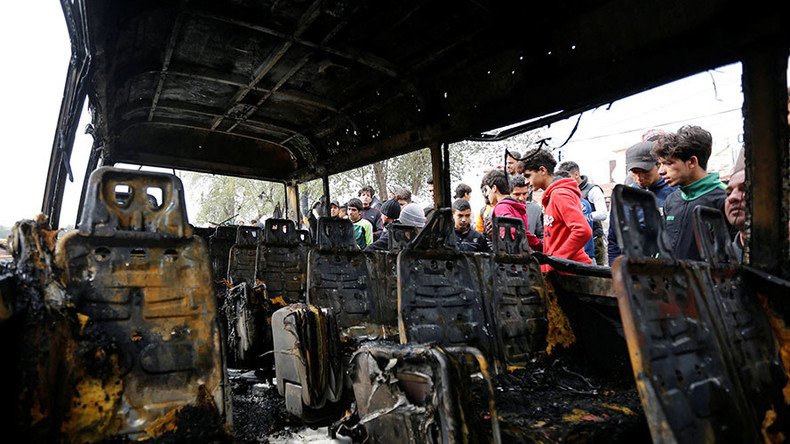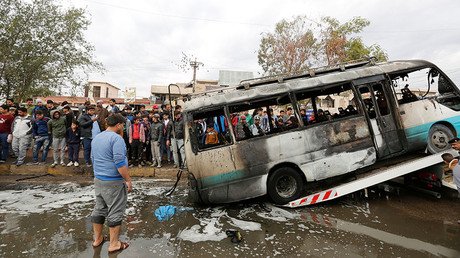'Mosul is the next Aleppo, Iraq's fight against ISIS will be decided there'

Clearly ISIS militants are desperately trying to sow unrest in Iraq, reverting to guerrilla tactics and trying to scare the population into submission, Catherine Shakdam, Shafaqna Institute for Middle Eastern Studies, told RT.
A car bomb exploded in Baghdad’s Sadr City, killing at least 32 people and injuring 61, AFP reported, citing police sources. Islamic State terrorist group has claimed responsibility for the attack.
The attack targeted Shiite Muslims, it claimed.
RT spoke with Catherine Shakdam for her views on the latest attack purported to be carried out by ISIS.
RT: What does today's attack tell us about the level of security in the country at the moment? This is the latest in a string of recent bombings.
Catherine Shakdam: Clearly ISIS militants are desperately trying to sow unrest. What they are doing is reverting to the guerrilla tactics, trying to scare the population into submission. This is what they have done for the past few years, not just in Iraq, but in Syria, and arguably in other countries across the Middle East. I doubt it is going to work. It never has worked.
When it comes to terrorism, the Iraqi people if anything have proven to be very resilient and very courageous, and I don’t think that we talk about this enough. The fact that popular committee militias have actually organized themselves to fight those terror militants, this ISIS army, to reclaim their land and their national identity. We tend to forget that what terrorists are trying to do is to explode nationality – the sense that a people belong to a certain land, a certain culture, certain tradition so that they could imprint their own. This is something that the Iraqis have had to fight...
So, there is nothing new here, when you see what is happening to Mosul. And of course now Mosul has become the next Aleppo. Everything will be decided there, and ISIS is on the run quite clearly. They are throwing everything that they have in Iraq, because if Iraq is indeed liberated, there is nowhere else to go for them.
URGENT: Blast hits Sadr City area of #Baghdad, at least 10 killed – reports https://t.co/Bny0iciNZT
— RT (@RT_com) 2 января 2017 г.
RT: Senior military officials suggest it could take another three months to liberate Mosul. Is that too optimistic? How do you see the situation playing out there?
CS: There is no doubt in my mind that Mosul would be liberated, and the Iraqi army and Iraqi people re-reclaimed their land, but this is for me a certainty. It is very difficult to say whether it is going to take a month, two, three, four, five, six – we don’t know. The point is: what happened in Aleppo will happen in Mosul – it will be liberated and ISIS will be pushed back, because ISIS is a foreign entity in the land. There is no support in Iraq for this terror group. So it is going to have to go; it is going to be flushed out. The difficulty would be that it depends on how those powers that continue to fund terrorism will actually handle the situation. Will they decide to kind of redraw, understanding that in fact they already have lost... or will they continue to try and justify their existence, searching for an enclave in the Middle East?
RT: Experts fear the military operation in Mosul could lead to a problem even bigger than Islamic State itself. The Mosul Dam, for example, Iraq's largest, is already in poor condition. With the battle for the barrier wall now ongoing, the offensive could destroy it, causing the structure to collapse, potentially putting millions of lives at risk here. Do you think it is really this bad?
CS: I do think so. When it comes to using terror - and that would be the greatest act of terror in history - if the dam was to in fact be broken and the water was unleashed. But I think this is something that ISIS would do if they are pushed far enough against the wall, and they see no way out. This is something that they would definitely consider.
But again you have to understand the ideology behind ISIS. Those people are absolutely intent and bent on destroying everything that they touch. It is not about creating a new reality for the Middle East or even reclaiming some kind of religious righteousness. What they want is to submit an entire people - in bloody, literally - this is what they live for, they are complete sociopaths.
So yes, if they feel that the dam is something that is a card that they hold in their hand and that they could maybe blackmail the government in Baghdad into submission by using this, I believe that they will. Whether it is going to happen or not, again, it is very difficult to say. I’d like to think that the Iraqi army and those militias supporting them will get in there first and destroy ISIS before they could even fathom doing it. I certainly hope so, because it would be a great catastrophe not just for Iraq, but for the Middle East all together...
The statements, views and opinions expressed in this column are solely those of the author and do not necessarily represent those of RT.













